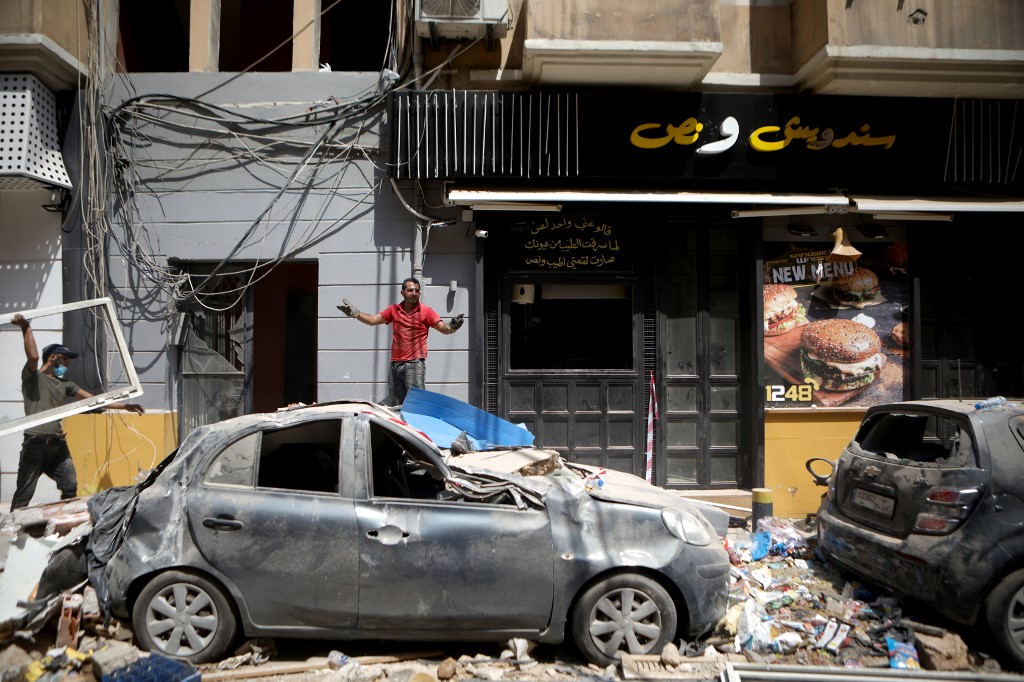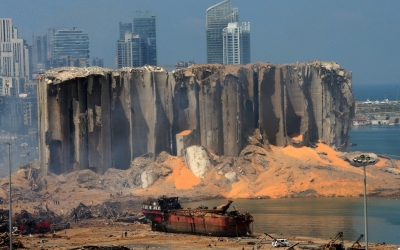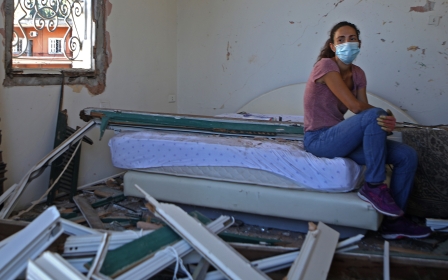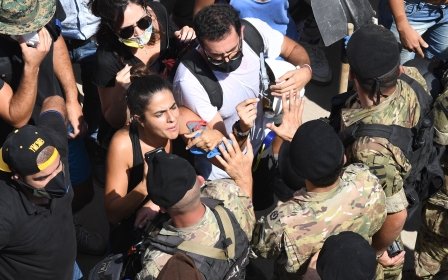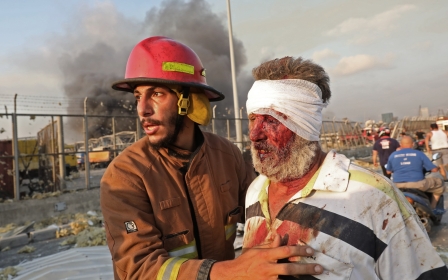Beirut explosion: A weapon of mass corruption
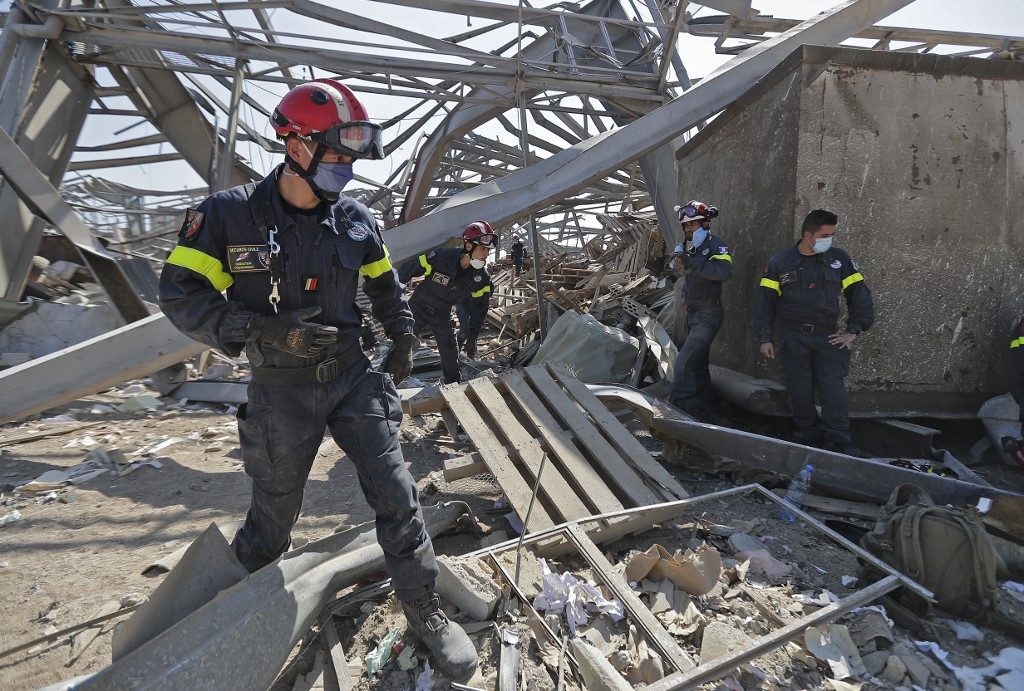
Days after Beirut’s apocalyptic explosion, as I walk back and forth in my apartment, glued to my three-year-old daughter, I wonder whether I should keep my fully charged mobile phone with me.
“What if something happens, and we get trapped under the rubble? I would need to call someone for help.”
I now move around the apartment like an explosives expert, wondering where would be the best spot to hang out.
I blame myself for placing the living-room sofa under a big window, where we were sitting when the building started shaking. Such thoughts haunt my mind.
Attentive pragmatism
New MEE newsletter: Jerusalem Dispatch
Sign up to get the latest insights and analysis on Israel-Palestine, alongside Turkey Unpacked and other MEE newsletters
I don’t think I am traumatised. I am just being attentively pragmatic; in Beirut in 2020, pragmatism is also about how to survive an ammonium nitrate explosion that sounded like a combination of an earthquake and artillery-shell blasts, until we learned about the chemical formula NH4NO3. It’s never too late to learn something new in this country.
When our building started shaking, more than six kilometres from the port, I held my daughter tightly in my arms, covering her head and telling her everything would be okay. As we ran outside the apartment, thinking it was an earthquake before we heard the deafening bang, I asked my husband to reach for our daughter’s bottle of water. I was thinking that we would surely get trapped under the building, and she might get thirsty by the time support arrived - if it did.
I am not referring to faceless justice; we need names, and not any names - the real culprits' names
I am not a chemist, but I am a survivor of Beirut’s apocalyptic explosion. From what I have since read, ammonium nitrate is a white, crystalline, water-soluble chemical compound. It is generally used in agriculture as a fertilizer, but can also be a component of explosives used in mining and construction. It has been phased out by a number of countries amid safety and security concerns.
In my country, however, ammonium nitrate has earned itself a new functionality: a weapon of mass corruption.
“We knew that they were dangerous materials, but not to that extent,” the port’s director general said the day after the blast. He was referring to the 2,750 tonnes of ammonium nitrate.
The costs of bad governance
As an economist by training, I have always been fond of numbers: 2,750 tonnes equals around 2.75 million kilograms or six million pounds. The size of the blue whale, the world’s largest animal, is around 200 tonnes. Around 14 blue whales were parked in the Beirut port, which is 1.2 square kilometres in size and employs around 600 people.
One authority figure said he would not rest until three culprits were convicted. In my rough calculations, we would need at least 14 culprits. (In Lebanese dialect, people use the term “whales” when they talk about men in power.)
In the past decade, economists have been exerting more efforts to quantify the costs of corruption and bad governance. I have given these attempts a vigilant eye, and find them quite useful in stirring important debate and empowering those who advocate for good governance.
One of the interesting and controversial indices is the “Fragile States Index” by the Fund for Peace. In 2020, Lebanon’s total score was 84.7 (120 is the maximum), down from 95.7 in 2008.
Relevant indicators include the public services indicator, which includes “the state’s ability to protect its citizens, such as from terrorism and violence”; and the state legitimacy indicator, which takes into account “the openness of ruling elites to transparency, accountability and political representation, or conversely the levels of corruption, profiteering, and marginalising”.
New political folk music
The 4 August explosion showed clearly that corruption and good governance should become tools of criminal accountability, but for them to become more relevant, a bigger effort should be made to give them a human face.
A corruption index that does not take into account the number of victims killed in “accidental catastrophes” - or the number of children orphaned, houses destroyed, jobs lost, lives distressed and memories vanished in a beautiful city, my city - is simply not relevant anymore.
As I walked though Beirut two days after the explosion, I couldn’t help but feel angry at all the songs we once chanted - songs about “victory”, “hope” and “resilience”.
We need new political folk music that talks about accountability, retribution and justice - music that praises sleepless anger, which will not fade away unless our city, and all of us as victims of mass corruption, are at peace with what happened
This cannot be delinked from justice. And I am not referring to faceless justice: we need names, and not any names - the real culprits’ names.
The views expressed in this article belong to the author and do not necessarily reflect the editorial policy of Middle East Eye.
Middle East Eye delivers independent and unrivalled coverage and analysis of the Middle East, North Africa and beyond. To learn more about republishing this content and the associated fees, please fill out this form. More about MEE can be found here.



